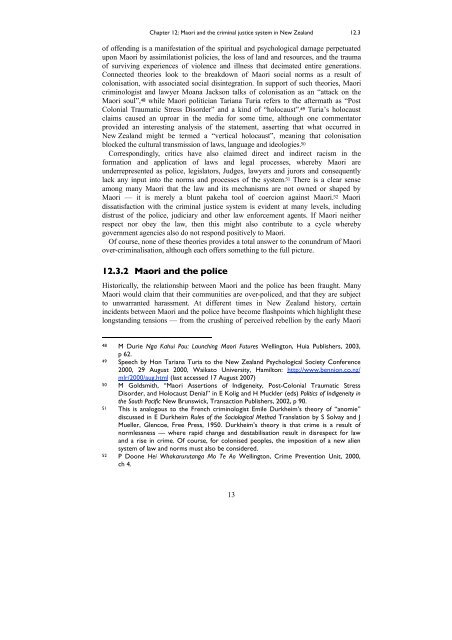QUINCE, K "MÄori and the Criminal Justice System in New Zealand"
QUINCE, K "MÄori and the Criminal Justice System in New Zealand"
QUINCE, K "MÄori and the Criminal Justice System in New Zealand"
Create successful ePaper yourself
Turn your PDF publications into a flip-book with our unique Google optimized e-Paper software.
Chapter 12: Maori <strong>and</strong> <strong>the</strong> crim<strong>in</strong>al justice system <strong>in</strong> <strong>New</strong> Zeal<strong>and</strong> 12.3<br />
of offend<strong>in</strong>g is a manifestation of <strong>the</strong> spiritual <strong>and</strong> psychological damage perpetuated<br />
upon Maori by assimilationist policies, <strong>the</strong> loss of l<strong>and</strong> <strong>and</strong> resources, <strong>and</strong> <strong>the</strong> trauma<br />
of surviv<strong>in</strong>g experiences of violence <strong>and</strong> illness that decimated entire generations.<br />
Connected <strong>the</strong>ories look to <strong>the</strong> breakdown of Maori social norms as a result of<br />
colonisation, with associated social dis<strong>in</strong>tegration. In support of such <strong>the</strong>ories, Maori<br />
crim<strong>in</strong>ologist <strong>and</strong> lawyer Moana Jackson talks of colonisation as an “attack on <strong>the</strong><br />
Maori soul”, 48 while Maori politician Tariana Turia refers to <strong>the</strong> aftermath as “Post<br />
Colonial Traumatic Stress Disorder” <strong>and</strong> a k<strong>in</strong>d of “holocaust”. 49 Turia’s holocaust<br />
claims caused an uproar <strong>in</strong> <strong>the</strong> media for some time, although one commentator<br />
provided an <strong>in</strong>terest<strong>in</strong>g analysis of <strong>the</strong> statement, assert<strong>in</strong>g that what occurred <strong>in</strong><br />
<strong>New</strong> Zeal<strong>and</strong> might be termed a “vertical holocaust”, mean<strong>in</strong>g that colonisation<br />
blocked <strong>the</strong> cultural transmission of laws, language <strong>and</strong> ideologies. 50<br />
Correspond<strong>in</strong>gly, critics have also claimed direct <strong>and</strong> <strong>in</strong>direct racism <strong>in</strong> <strong>the</strong><br />
formation <strong>and</strong> application of laws <strong>and</strong> legal processes, whereby Maori are<br />
underrepresented as police, legislators, Judges, lawyers <strong>and</strong> jurors <strong>and</strong> consequently<br />
lack any <strong>in</strong>put <strong>in</strong>to <strong>the</strong> norms <strong>and</strong> processes of <strong>the</strong> system. 51 There is a clear sense<br />
among many Maori that <strong>the</strong> law <strong>and</strong> its mechanisms are not owned or shaped by<br />
Maori — it is merely a blunt pakeha tool of coercion aga<strong>in</strong>st Maori. 52 Maori<br />
dissatisfaction with <strong>the</strong> crim<strong>in</strong>al justice system is evident at many levels, <strong>in</strong>clud<strong>in</strong>g<br />
distrust of <strong>the</strong> police, judiciary <strong>and</strong> o<strong>the</strong>r law enforcement agents. If Maori nei<strong>the</strong>r<br />
respect nor obey <strong>the</strong> law, <strong>the</strong>n this might also contribute to a cycle whereby<br />
government agencies also do not respond positively to Maori.<br />
Of course, none of <strong>the</strong>se <strong>the</strong>ories provides a total answer to <strong>the</strong> conundrum of Maori<br />
over-crim<strong>in</strong>alisation, although each offers someth<strong>in</strong>g to <strong>the</strong> full picture.<br />
12.3.2 Maori <strong>and</strong> <strong>the</strong> police<br />
Historically, <strong>the</strong> relationship between Maori <strong>and</strong> <strong>the</strong> police has been fraught. Many<br />
Maori would claim that <strong>the</strong>ir communities are over-policed, <strong>and</strong> that <strong>the</strong>y are subject<br />
to unwarranted harassment. At different times <strong>in</strong> <strong>New</strong> Zeal<strong>and</strong> history, certa<strong>in</strong><br />
<strong>in</strong>cidents between Maori <strong>and</strong> <strong>the</strong> police have become flashpo<strong>in</strong>ts which highlight <strong>the</strong>se<br />
longst<strong>and</strong><strong>in</strong>g tensions — from <strong>the</strong> crush<strong>in</strong>g of perceived rebellion by <strong>the</strong> early Maori<br />
48 M Durie Nga Kahui Pou: Launch<strong>in</strong>g Maori Futures Well<strong>in</strong>gton, Huia Publishers, 2003,<br />
p 62.<br />
49 Speech by Hon Tariana Turia to <strong>the</strong> <strong>New</strong> Zeal<strong>and</strong> Psychological Society Conference<br />
2000, 29 August 2000, Waikato University, Hamilton: http://www.bennion.co.nz/<br />
mlr/2000/aug.html (last accessed 17 August 2007)<br />
50 M Goldsmith, “Maori Assertions of Indigeneity, Post-Colonial Traumatic Stress<br />
Disorder, <strong>and</strong> Holocaust Denial” <strong>in</strong> E Kolig <strong>and</strong> H Muckler (eds) Politics of Indigeneity <strong>in</strong><br />
<strong>the</strong> South Pacific <strong>New</strong> Brunswick, Transaction Publishers, 2002, p 90.<br />
51 This is analogous to <strong>the</strong> French crim<strong>in</strong>ologist Emile Durkheim’s <strong>the</strong>ory of “anomie”<br />
discussed <strong>in</strong> E Durkheim Rules of <strong>the</strong> Sociological Method Translation by S Solvay <strong>and</strong> J<br />
Mueller, Glencoe, Free Press, 1950. Durkheim’s <strong>the</strong>ory is that crime is a result of<br />
normlessness — where rapid change <strong>and</strong> destabilisation result <strong>in</strong> disrespect for law<br />
<strong>and</strong> a rise <strong>in</strong> crime. Of course, for colonised peoples, <strong>the</strong> imposition of a new alien<br />
system of law <strong>and</strong> norms must also be considered.<br />
52 P Doone Hei Whakarurutanga Mo Te Ao Well<strong>in</strong>gton, Crime Prevention Unit, 2000,<br />
ch 4.<br />
13

















